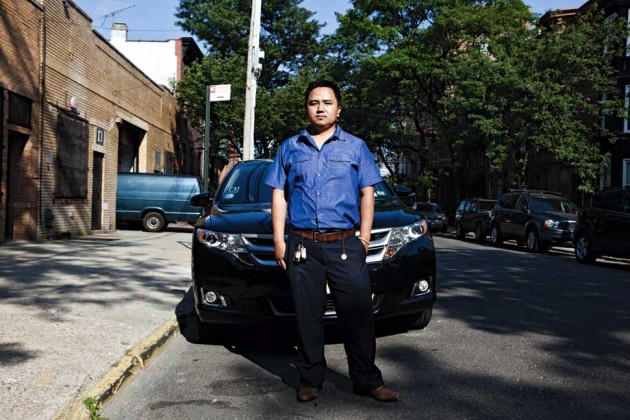
“Everyone’s private driver.” That’s how Uber trumpeted its business model when the taxi alternative started five years ago. For riders, it promised an end to overpriced trips in dirty, run-down cabs; for drivers, it offered an escape from working for a garage. On the back of buses in New York City, Uber puts ads aimed at cabbies, and just about anyone else with a driver’s license and a little free time—“Drive With Uber: Get Your Own Car for Under $30/Day, No Credit Needed.”
Early on, the company was able to escape the attention of the taxi system it sought to upend. Its drivers, mostly livery car operators who used Uber’s app to connect with passengers looking for rides, provided a premium service and were vastly outnumbered by taxis. In 2012 the company introduced UberX, which allows nonprofessional drivers to make money on the side ferrying passengers in their own cars, the way Airbnb helps people rent out their homes. Now, with tens of thousands of drivers in 140 cities worldwide, Uber no longer has the luxury of going unnoticed. The company has become the target of city and state legislators and union activists who want it to follow the same rules as real taxis.
Taxi drivers must meet training, licensing, and vetting requirements. Cabs are regularly inspected, and drivers have their licenses reviewed annually. While operators of Uber’s black cars are held to commercial standards, new UberX drivers are only asked to pass a criminal background check, carry a license and proof of auto insurance, and have access to a vehicle in “excellent” or “exceptional” condition. The company says it monitors them, but a recent police sting at San Francisco’s airport caught nine UberX drivers operating without proof of insurance.
In June, Virginia ordered Uber to cease operations until it “obtains proper authority” to do business in the state. Police are issuing citations for as much as $500 to drivers caught picking up passengers. Nevada and Massachusetts joined insurance authorities in 16 other states in sending alerts alleging Uber drivers aren’t always insured. Unions representing traditional taxi drivers are piling on, too: The Teamsters are trying to organize Uber drivers in Los Angeles and Seattle.
The company says it’s being singled out by political hacks who have an interest in preserving the old system. “We’re in this political campaign, and the candidate is Uber,” the company’s chief executive officer, Travis Kalanick, said at a tech conference in May. “And the opponent is an a–hole named Taxi.”
With a $17 billion valuation and backing from Google (GOOG), Uber is taking a decidedly establishment approach to fighting the Establishment, hiring top lobbying firms in states where politicians are trying to regulate its business. In Illinois, where the company ran into opposition in Chicago, it retained Michael Kasper, a confidant of Mayor Rahm Emanuel; in Washington, D.C., it hired the Franklin Square Group, run by Joshua Ackil, a veteran of the Clinton White House. In California, where a bill advancing through the legislature would impose new insurance requirements on ride-sharing companies, Uber is represented by the lobbying firm Gonzalez, Quintana & Hunter, which also works for Facebook (FB).
 are for everybody. People use them left and right. It has been a tradition for a long time.”—Petre Akaliyski, New York yellow taxi driver” credit=”Photograph by Alex Welsh for Bloomberg Businessweek” data_type=”link”]
are for everybody. People use them left and right. It has been a tradition for a long time.”—Petre Akaliyski, New York yellow taxi driver” credit=”Photograph by Alex Welsh for Bloomberg Businessweek” data_type=”link”]
“They’ve hired nearly every lobbyist in Sacramento,” says Susan Bonilla, a California Democratic assemblywoman who introduced the bill, which would require Uber to insure drivers whenever they’re in their cars with the company’s app running, not just when carrying passengers. It’s partly a response to the death of 6-year-old Sofia Liu, who was hit and killed by an Uber driver in a San Francisco crosswalk on New Year’s Eve. The driver had personal insurance, but Uber refused to add to the payout to the girl’s family because the driver had no passenger at the time. Liu’s family sued. “This was a tragic accident,” says Uber spokeswoman Eva Behrend, who declined to comment on the pending litigation. In March, Uber began offering $100,000 of supplemental liability insurance to drivers whose own policies deny claims for accidents that happen between fares.
On June 5, Colorado became the first state to grant the company statewide approval. Drivers there won’t be required to meet existing taxi standards. In May, Boston Mayor Martin Walsh set up a task force to modernize the city’s taxi rules. He’s hinted they will leave room for Uber to operate. “There is a balance,” he said. In New York and Washington, D.C., UberX is allowed to do business alongside heavily regulated taxis. Securing a foothold in a few major cities could help ease Uber’s way in places that are trying to shut it down. And the company’s public political battles may turn out to be useful in attracting new customers and supporters. In the end, argues Arun Sundararajan, a professor at New York University’s Stern School of Business, “The more they sort of popularize themselves, the stronger their argument becomes.”
Source : Businessweek.com
